Only in the Philippines: Culture Unique to the Pearl of the Orient Seas
There is certainly something different about being in the Philippines, something that stays in our hearts and lingers in our minds no matter where we may be in this big world. Is it the famous Manila Bay Sunset? The long days lounging in Palawan cottage built on stilts? Or the times you’d stay up until the wee hours of the morning partying away in Boracay? These are all things the Philippines is famous for, but the cherry on top would definitely be the experience of Philippine culture.
A hodgepodge of many cultural influences, the Philippines is as mixed as a salad. Here you’ll find many religions, ethnic groups, dialects and social classes. But despite their many differences, Filipinos also share similarities, particularly when it comes to customs, traditions, and beliefs. These are the Filipino’s trademark to the world, what distinguishes this nation from others. It is embedded in their genetic makeup and has been passed on from generation to generation since time immemorial.
Dedication to Religion

Photo by Marc ReilGepaya via Flickr
The Philippines is a predominantly Catholic country and you will constantly be reminded of this throughout your stay. It is part of Filipino’s weekly routines to go to Church as a family every Sunday. If their schedule permits, some even go every day! The Filipino’s faith in God is distinctly noticeable as you will literally see it everywhere. Jeepneys have Jesus’ face on them and you will most likely pass a church every time you go out. Devout ones also strictly follow different customs, such as making the sign of the cross every time they pass a church. They also make it a point to have fiestas and processions during saints’ feast days.
One of the most famous ways many Filipino Catholics exhibit their faith is through the Feast of the Black Nazarene which happens every January where over 12 million Filipinos participate. Never mind that some of them die in the process, as long as they exercise their faith! They flock to Manila’s Quiapo District and participate in the Translacion. The procession has also attracted visiting foreigners.
Celebrations
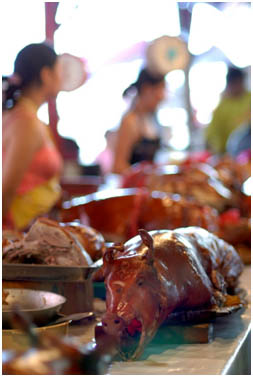
Photo by: エンバルドマンviaFlickr
Filipino celebrations such as birthdays are anything but simple. Get ready for a lot of eating, chatting, drinking…and then more eating. Be prepared for members of the host family telling you not to be shy and to just keep eating. Whatever you do, don’t act awkward and just go with the flow. Filipino’s are naturally hospitable people (just look at how they accepted Magellan and his fleet as friends). They treat guests as family. So while you’re there, treat them as one, too. And don’t forget to be kind to them even after the celebration.
Holidays such as Christmas are spent by many Filipinos not just with their families, but their whole clan as well. This is where brothers, sisters, cousins, aunts, uncles and even second-cousins get to catch up with each other. Usually, the set-up is potluck. Families that like to keep it more intimate usually have dinner together at home with only the grandparents, the parents and grandkids. A lot of delicious food, of course, is still very much involved.
A wedding, on the other hand, is a really big deal to the point that, in provinces where everybody knows everybody, it is almost a town event. Not only the bride and groom’s friends are invited but their parents’ friends as well. Their siblings and relatives are also expected. Powerful and successful personalities who are friends of the family are usually invited to the wedding and made principal sponsors. There are also other customs in certain places when it comes to weddings, such as the pinning of money on the bride and grooms clothes so that their marriage will be prosperous.
Manners Matter

Photo by: Adam Cohn via Flickr
We are almost a 100% sure you won’t find any other country whose people say po and opo to their elders. Anything said by a younger Filipino to someone older should end with the po and one answers opo instead of just “yes” or oo in Tagalog.
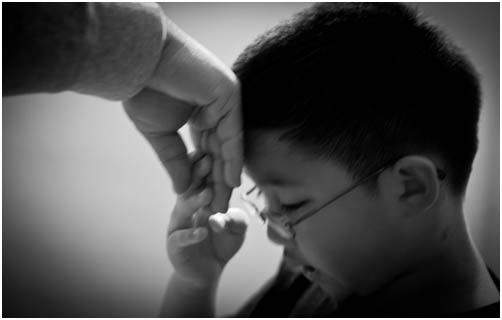
Photo by: Mommysaurus75 via Flickr
By now, you can see that Filipinos take their manners seriously. Another Filipino custom would be making mano” to elders. It is not unusual to see Filipino youth lifting their parent’s, grandparent’s, aunt’s and uncle’s hands to their foreheads as a sign of respect after Holy Mass and when they come home from school or work.
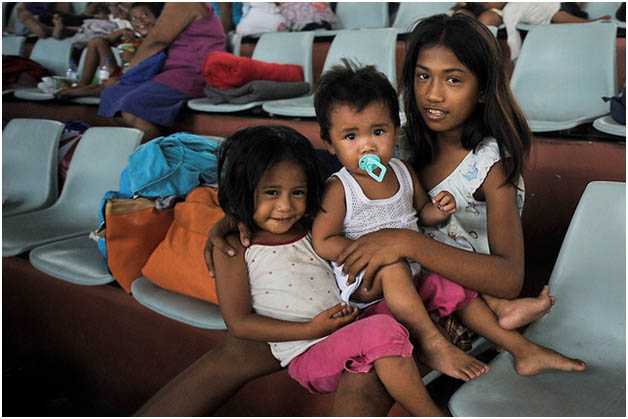
Photo by: Internation Organization for Migration via Flickr
Aside from elders in the family, respect is also shown for older siblings. Filipinos show this respect by calling their elder siblings ate and kuya. In the Philippines, it is an unspoken rule that the eldest sibling watches over the younger ones and they call the shots in their parents’ absence. Po and opo are also used by younger siblings when talking with their ate’s and kuya’s.
Meal Time
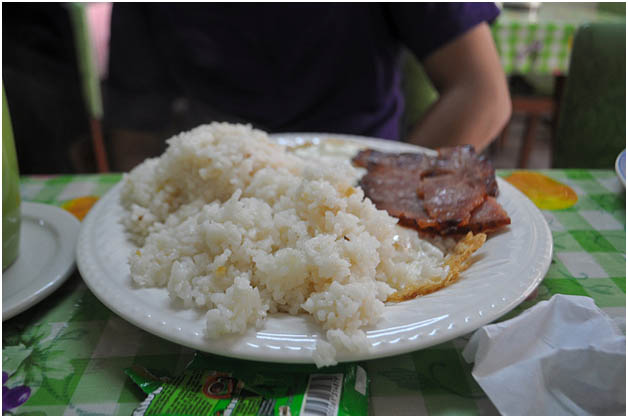
Photo by: Jaya via Flickr
Filipinos are in love with food, but they have a special and intimate affair with rice. This is the reason rice-all-you-can restaurants have been showing up around the country. Try eating in one and you’ll be surprised with how many cups of rice a Filipino can consume! Some can live without rice though, but for others, a meal is incomplete without it.
Eating is more than just a way of feeding ones hunger in the Philippines. It creates a bond between you, the place you are visiting or eating in, and the people you are sharing the meal with. Here, you not only get to enjoy the food but the stories and laughter of your friends and family as well. When eating in the Philippines, one shouldn’t miss trying out local favorites such as adobo and kare–kare.
When on the road
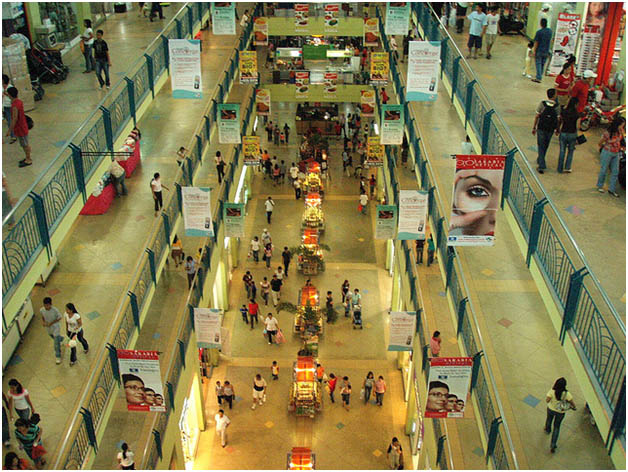
Photo by: Jun Acullador via Flickr
When out and about in the Philippines, there are a few unspoken rules or common practices. For example, in public bathrooms, people usually fall in line and wait for their turn to use the available cubicles. Since Filipinos are very particular when it comes to cleanliness, bathrooms in malls and gasoline stations are regularly cleaned throughout the day. Thus, one must not throw used material in the toilet bowls and keep it as clean as it was when you went in. Trash bins are more often than not provided inside the cubicle.
Another would be crossing the street. If you see people jay walking, do not follow them. Although some people do this and survive, it doesn’t mean others do it and survive as well. There are pedestrian lanes, overpasses and underpasses that one can use to get around when walking. Believe the signs when they say ‘Wag tumawid, nakamamatay. (Do not cross, someone has died here).
When it comes to driving, it is also best to stick to the rules. Contrary to popular belief, the yellow light does not mean go faster. Other drivers will cut you off and such but it is important to keep your cool and you should also avoid cutting off others as well. You wouldn’t want to be screamed at or given the dirty finger in the middle of EDSA. When on a road trip and you find yourself lost, do not hesitate to ask a local. Just remember to be polite. When in provinces, though, they seem to have a different understanding of what near is. Near for them might be 5 kilometers for us so be patient and observant of your surroundings.
Certain activities such as smoking have designated areas. You can’t just smoke anywhere you want to in the Philippines. In these designated areas, there are large ashtrays that you and your fellow smokers can use. Failure to comply may result to a penalty of Php1000 on the first offense, Php2000 on the second offense and Php3000 or detention disposal of 3-6 days on the third offense.
When staying overnight in a hotel, one can go for smart casual attire, as long as you do not look sloppy (as to maintain the place’s atmosphere). Various hotels have restaurants, so it is best to research in advance what their dress codes are and what cuisines they offer.
Cheerfulness amidst Tragedy
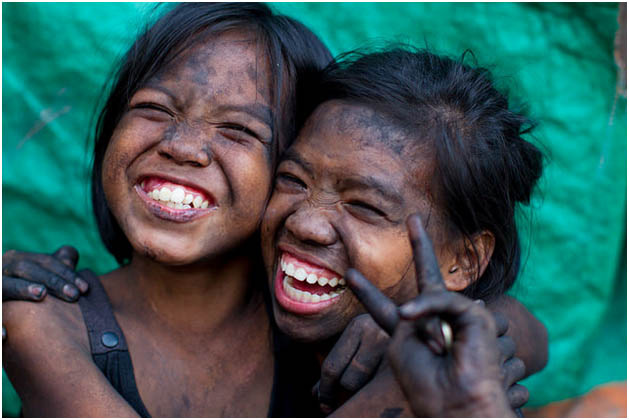
Photo by: Adam Cohn via Flickr
Don’t be surprised to see Filipinos waving and smiling at a television camera documenting a fire behind their backs. Filipinos are naturally cheerful people who always cling on to God in times of trouble. Most Filipinos believe that “God will not put us through something that we cannot handle.” The world could be falling apart (like what happened in Yolanda) and you’d still see Filipino children making peace signs in the television. Yes, some might find it unusual. But hey, only in the Philippines right?
Despite the Filipino’s diaspora, thus bringing their presence in places all over the globe, this is what binds them: a unique set of customs and traditions. This is what connects them to their homeland, the precious pearl of the orient seas. And this is what every foreigner visiting this country will leave with in their hearts and minds whether they realize it or not.
—–
Article by Carol Premacio













